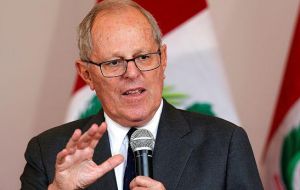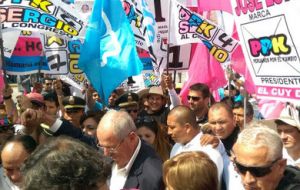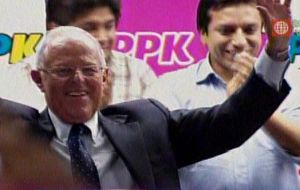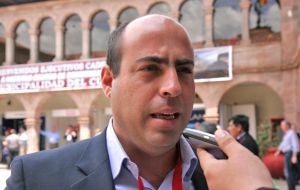MercoPress. South Atlantic News Agency
Kuczynski becomes Peru's next president, with minimum support in Congress
 Four days after voting, electoral officials said that all ballots had been processed and Kuczynski had won 50.1% compared to 49.9% for Keiko Fujimori.
Four days after voting, electoral officials said that all ballots had been processed and Kuczynski had won 50.1% compared to 49.9% for Keiko Fujimori.  Supporters celebrated outside Kuczynski’s campaign headquarters while the apparent president-elect made a plea for dialogue with his opponent
Supporters celebrated outside Kuczynski’s campaign headquarters while the apparent president-elect made a plea for dialogue with his opponent  “We shouldn’t confuse dialogue with weakness. We’re going to be decisive but we’re going to work on behalf of all Peru” said the elected president
“We shouldn’t confuse dialogue with weakness. We’re going to be decisive but we’re going to work on behalf of all Peru” said the elected president  Pedro Spadaro, a congressman and aide to Fujimori, said that his campaign is waiting for the National Electoral Board, to proclaim a winner before conceding.
Pedro Spadaro, a congressman and aide to Fujimori, said that his campaign is waiting for the National Electoral Board, to proclaim a winner before conceding. Former World Bank economist Pedro Pablo Kuczynski won the majority of votes in Peru’s closest presidential contest in five decades, election officials announced Thursday, even as his rival Keiko Fujimori had yet to concede defeat.
Four days after voting, electoral officials said that all ballots had been processed and Kuczynski had won 50.1% compared to 49.9% for the daughter of imprisoned ex-President Alberto Fujimori.
Supporters immediately celebrated outside Kuczynski’s campaign headquarters while the apparent president-elect made a plea for dialogue with his opponent and other rival political forces.
“We receive this virtual verdict with great humility because Peru has huge challenges ahead of it,” he told supporters. “We shouldn’t confuse dialogue with weakness. We’re going to be decisive but we’re going to work on behalf of all Peru because many Peruvians feel the train has left them behind and we want everyone to get on board.”
Despite the celebratory atmosphere, Fujimori’s campaign seemed in no rush to recognize defeat.
Pedro Spadaro, a congressman and aide to Fujimori, said that his campaign is waiting for the National Electoral Board, the nation’s top electoral authority which sits above the election officials who made Thursday’s announcement, to proclaim a winner before conceding.
Fujimori’s last hope is some 173 handwritten tallies — representing as many as 50,000 votes — that were sent for review. Among the irregularities detected were counting more ballots than actual voters at certain polling stations, and allegations that volunteers from Kuczynski’s campaign worked at multiple polling stations in violation of electoral law.
Still, experts say it’s almost impossible for Fujimori to make up the roughly 40,000 vote difference to overtake Kuczynski.
Fujimori was the favorite to win the runoff but lost ground in the final stretch as fellow conservative Kuczynski warned voters that the corruption and criminality associated with her father’s authoritarian rule could return.
Alberto Fujimori is serving a 25-year jail sentence for corruption, organized crime and sanctioning death squads. While he is loathed by many in Peru, he is revered by others for taming Maoist Shining Path guerrillas and hyperinflation, and Sunday’s election was seen partly as a referendum on his iron-fisted rule in the 1990s.
Dozens of supporters of Fujimori have held demonstrations outside the electoral board to denounce what they said were fraud. But Fujimori’s aides have refused to talk in such stark terms and say that the interests of Peru override whatever political differences exist between the two campaigns.
While the campaign ended bitterly, with Kuczynski abandoning his preferred technocrat’s discourse and accusing Fujimori of being the harbinger of a “narco state,” most observers expect him to try and work with his former rival.
That’s part a reflection of shared ideology — both candidates embrace a pro-business agenda and Kuczynski supported Fujimori in the 2011 presidential runoff — and the political reality facing Kuczynski, whose fledgling movement has 18 of 130 seats in congress compared with a solid majority of 73 seats for Fujimori’s Popular Force party.




Top Comments
Disclaimer & comment rules-

Read all commentsGash another Latam country whose next leader is a native, he must be with a name that he has. Kuczynski obviously a native.
Jun 10th, 2016 - 05:00 pm 0Commenting for this story is now closed.
If you have a Facebook account, become a fan and comment on our Facebook Page!